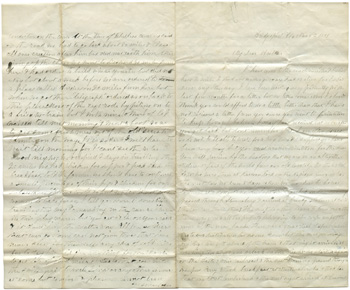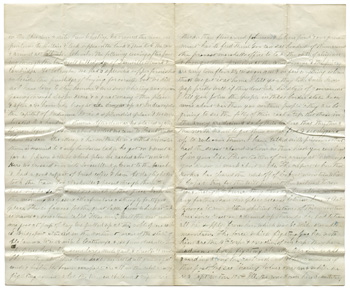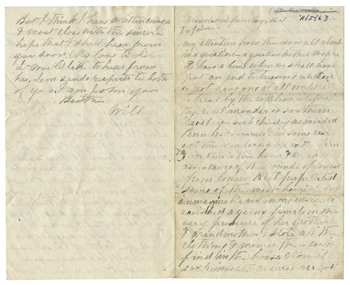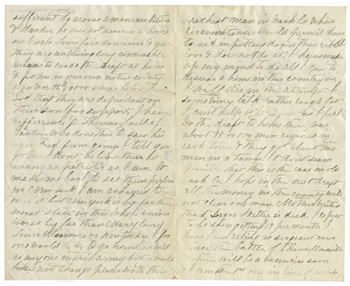Will Fisher to his brother
Bridgeport, Alabama
November 5, 1863
My dear Brother,
I have come to the conclusion that I shall have to write to find out whether you are dead or alive for I shan’t any other way. I have been waiting very patiently for the last few months for a letter but no letter comes. Now I should think you could afford to do a little better than that. I have not received a letter from you since you went to Princeton to keep house, I believe. I may have received one soon after you got back, but don’t remember it. I am often situated so as not to be able to write for a long time & I suppose you have been very busy, but you must answer this.
Now for the news. You will perceive by the heading that we are in an altogether different part of the world from our old locality. On the 24th of Sept. we were then at Raccoon Ford on the Rapidan River in Va. The next day we drew 8 days rations with orders to be ready to move at a moments notice. Sept. 25th marched in the morning, passed through Stevensburg & arrived at Brandy Station at dark (the cars ran there then).
The next day they began to turnover the teams, wagons & all the property belonging to the corps except the arms in the men’s hands. There was a great deal of speculation as to our destination, but no one knew. But the next morning our regt. was put aboard the train & that night arrived at Washington. About one o’clock in the night we started again on the Balt. & Ohio Railroad & the next morning passed through Harpers Ferry & took breakfast at Martinsburg, Ga. & took tea that night at Cumberland, & the next night arrived at Benwood on the Ohio River, 4 miles from Wheeling. We crossed the river on pontoons to Bellaire & took supper on the bank & then took the cars & arrived at Columbus the following evening after passing through the beautiful villages of Zanesville, Newark & Cambridge.
At Columbus we had a splendid supper furnished us besides the privilege of buying for ourselves, but we did not have long to stay however & were soon whirling away again passing through Dayton, Xenia & a great many other places & after a 40 hours ride brought up at Indianapolis, the capitol of Indiana. It is a splendid place & we were treated to a handsome dinner. After dinner we started again but now began to go south. About 5 o’clock we came to Franklin, Ind. There we saw Alex Morrey & his mother. He is a settled minister there, is married to a very handsome lady. He got on & went as far as Jefferson with us which place we reached about 11 o’clock. Here we crossed over into Louisville, Ky., went to the barracks & had a good repast of bread, coffee & ham.
At daylight we took the train for Nashville & passed through there the next night, so I did not see much of that place. Early in the morning we passed Murfreesboro, a strongly fortified place. This is famous for the great battle from which it takes it name or sometimes called “Stone River.”
Well, the next morning, just at peep of day, we pulled up at this noble place called Bridgeport, situated in the northwest corner of the state of Alabama. It is 28 miles to Chattanooga & 122 miles from Nashville, Tenn. the place looks like some large mule yard & dreadful muddy. The country about here looks sadly neglected, all grown up with weeds and bushes. Its former occupants are all in the Rebel army fighting against us, but the women, children & cripples are thicker than fleas around Johnson’s & Culver’s pond & our government has to feed them. You can see hundreds of them around the Provost Marshall’s office to take the oath of allegiance & then get the provisions at the commissaries & the prices are very low. Flour 2½ ct, sugar 10 ct, & in fact, everything is lower than we get it at home. I tell you they like Uncle Sam’s pap pretty well, if they don’t like his style of government.
I tell you, John, the people in these border states know more about the war than you northern people, & they are beginning to see the folly of their rash step. But those in the army are deceived so by their leaders that they think the North wants to put them underfoot & set niggers up to rule over them. I have talked with prisoners that had the most absurd notions in their heads you ever heard of in your life.
The situation of our army at Chattanooga you know as much about as I do. The report is here that Hooker has cleared the Rebels off of Lookout Mountain which I hope is true for this will permit the railroad to run clear through whereas they have not been able to run it any further than this place because between here & Chattanooga it runs within shelling distance of this mountain. Ever since Rosecrans advanced up there he has had to team all his supplies from here which was 60 miles around the mountain.
The forces which fighting Joe has with him re the 11th Corps & one division of our corps. They have had some sharp fighting already. Our div. is all guarding along the railroad. Our Col. has command of this post.
We see Charley Culver once in a while, he is a capt. in the 105th Ill. He runs down here as military conductor on the cars.
At the time of Wheeler’s cavalry raid on the road we had to go back about 50 miles & chased all over creation after him, but did not catch him. After giving up the chase we went to Decherd 40 miles from here & had orders to build winter quarters but did not stay but about a week before we were ordered to a place called Anderson 20 miles from here, but when we got there “telegraph” ordered us back to this place.
Most of the regt. rode by piling on to a freight train but I with nine other of Co. 4 waited till next morning & went on foot so as to get some fresh meat out of the old “secesh” farmers on the way.
It is so dark I will have to wait till morning for I can’t see the rules. Good night.
We occupied 2 days in traveling the 20 miles. We had chicken for supper and pork steaks for breakfast. Told the farmers we would have to confiscate a small percentage of their pigs and chickens for our subsistence. This we could do but we could not get the women to bake for us.
I tell you there is some difference traveling this way to marching in the ranks. There is this play march, but you get 50 pounds on your back and it don’t help the matter any. All the soldiers that ever go home cannot give those that have never been for themselves any idea of soldiering for today I would give anything for the chance to get lots of good milk and victuals that goes into the small pail of Uncle Zina’s or any other farmers at home.
But comforts and pleasures cannot draw my attention from the now all absorbing question — a question whether we are to have a home when we shall have put an end to treason & rebellion or not have one at all except it be tread by the ruthless step of the Rebel invader or southern chivalry, such chivalry as invaded Penn. last summer & in some cases got the men locked up in the barn, & went into the house & with the assistance of the fiends from lowest Hell perpetrated some of the most horrid deeds unimaginable and in one instance ravished a young female in the very presence of her mother and grandmother, & stole all the clothing & money they could find in the house.
Now if such insults as these are not sufficient to arouse a man’s ambition & dander he does not deserve a home on Uncle Sam’s fair domains, & yet they are contriving every conceivable means to evade the draft at home, & John in our own native county men worth $50,000 swear before their God that they are dependent on their son for support. I have reference to Thomas Snell of Easton who done this to save his son Fred from going.
I tell you John, I don’t believe there is many as patriotic as I am. It makes me boil to see them perform in New York. I am ashamed to own it, but New York is by far the worst state in this whole Union, worse, by far than Maryland, Tenn. Missouri or Kentucky. I, for one, would like to go home as well as anyone in this army, but I would not change places with the richest man in Wash. Co. whose circumstances would permit him to aid in putting down this rebellion & does not do it. I have made up my mind to do all I can to deserve a home in this country or I will die in the attempt.
I sometimes talk rather tough, but I can’t help it, it is just as I feel.
In the draft to home there was about 75 or 100 men required in each town & they got about two men in a town. It don’t seem possible that this is the case in old Wash. Co. I hope in the next draft all the money in the country will not clear one man.
Mother writes that Laegus Skellie is dead.
I expect to be soon getting $17 per month. I have been acting a sergeant ever since the battle of Chancellorsville & there will be a vacancy soon, & I am the 1st one in line of corps.
But I think I have written enough & must close with the sincere hope that I shall hear from you soon. My love to Sister L. I would like to hear from her. Lem sends respects to both of you.
I am John, your brother,
Will |
|




